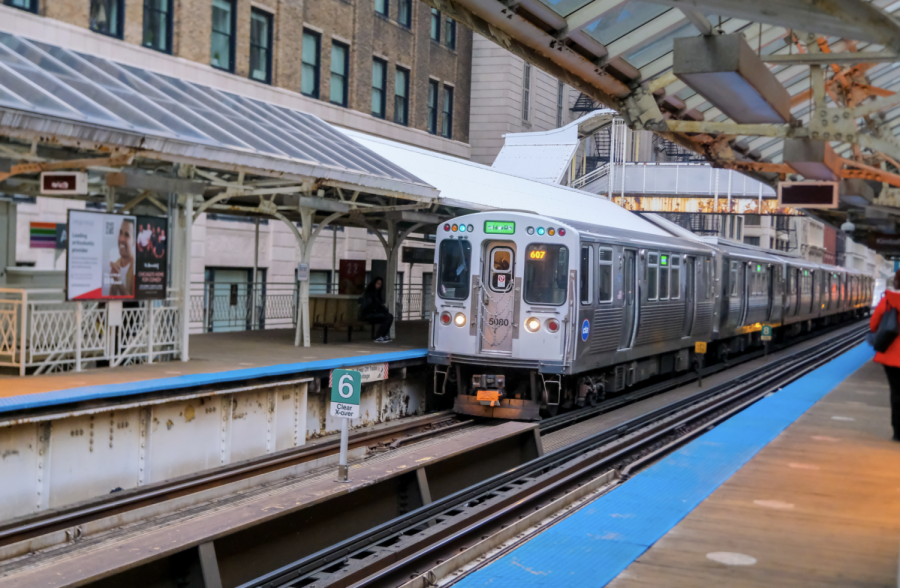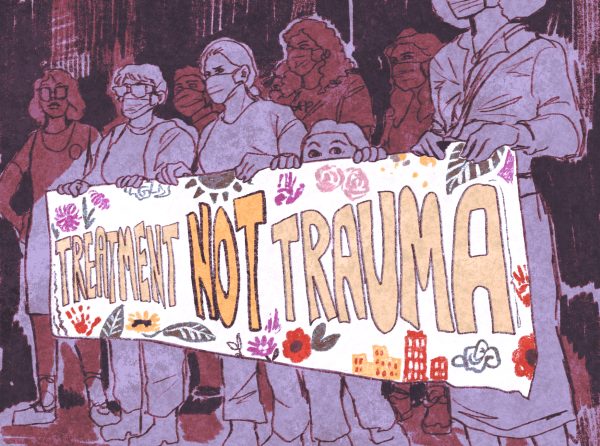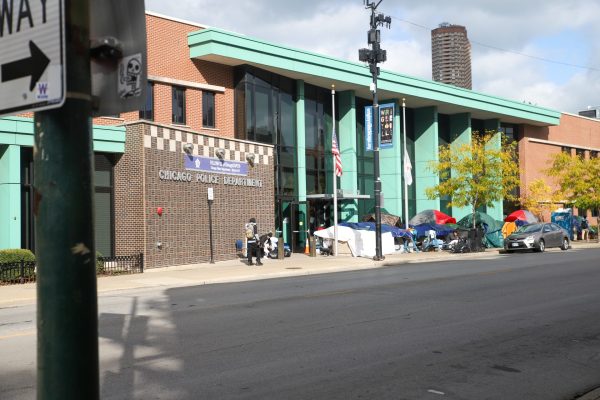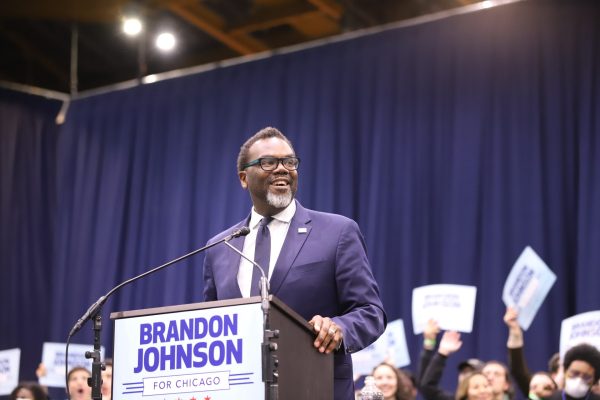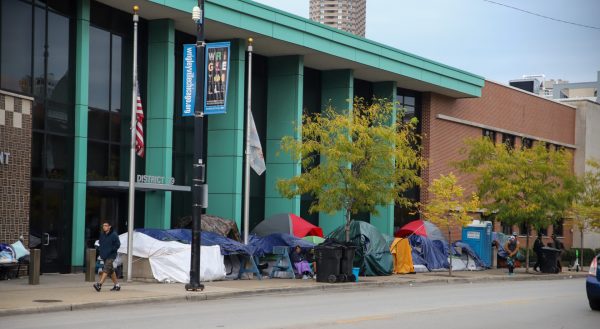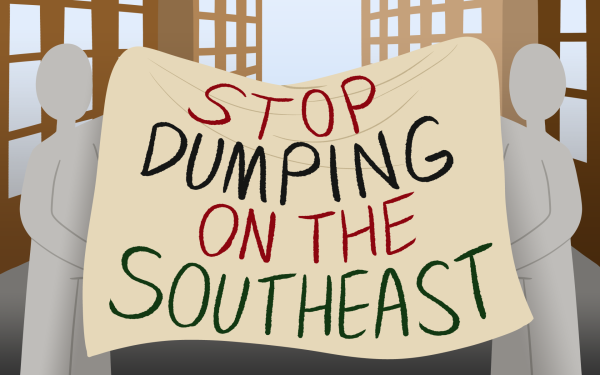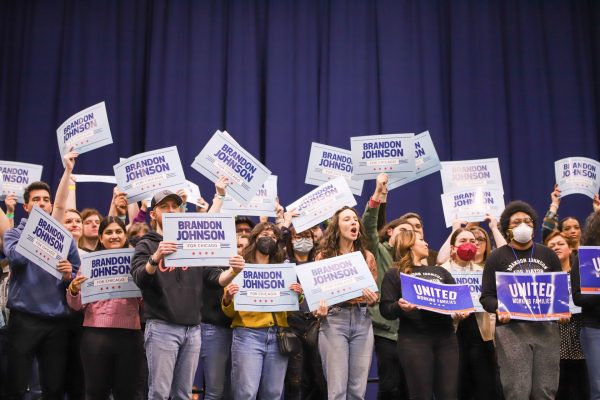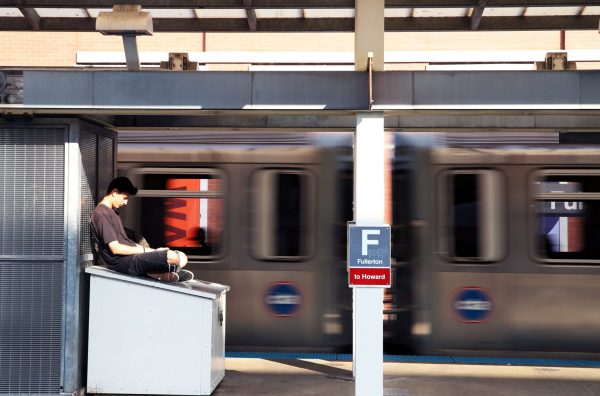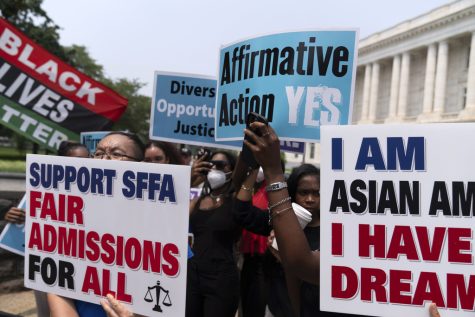CTA turned Marketplace: How the informal economy survives
A Green Line train bound for Ashland/63rd pulls into the Adams & Wabash St. stop. An informal economy, otherwise known as a survival economy, has begun to skyrocket on the CTA.
The Chicago Transit Authority (CTA) is a hub for a sector of the informal economy, a platform for riders to buy and sell goods.
According to the CTA’s Ordinance No. 98-126 Section 1.1, it is prohibited “to sell, offer for sale, sell and deliver, barter or exchange any goods, services or merchandise on property owned, operated or maintained by the CTA.”
The informal economy carries items people need or want. Suppliers seek to meet the demand of riders with grocery items like snacks, water, laundry detergent or other goods that interest riders. Just like in other markets, prices vary by train direction and time of day.
The informal economy, or survival economy, involves people who do not have access to the formal or luxury economy. There are barriers and exclusions in place that keep some workers from obtaining a job with regular paychecks and stability.
Equity and Transformation (EAT) is an organization that researches informal work in Chicago, and found that despite multiple hustles, 67% of informal workers do not make enough to pay their bills.
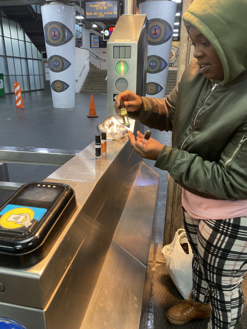
One rider makes her rounds on the CTA Red Line train, Dayjahna, a 19-year-old seller who preferred to only share her first name, approaches riders with her pouch of rollerball perfumes open, ready for potential customers to sample a sniff.
At $10 a pop, she carries 15 bottles at a time, one of each scent. Each bottle has a creative name on a homemade label to capture the essence of the scent.
Dayjahna also carries feminine products for sale but does not keep them on display. She said she can make $100 on a good day.
“I can’t afford for strangers to be put off by me, so I think about how I can be someone they trust,” Dayjahna said.
To make a good first impression, she approaches CTA riders with a smile and an inviting tone.
“I’m only 19 and I’m an entrepreneur,” she will say to people passing by.
Dayjahna is with the 29% of informal workers that have previously worked for a company that provided a regular paycheck. However, she still feels underqualified in applying to new positions, like one she recently applied to with the Hilton Hotels.
“Working at the Hilton would be a great fresh start,” she said. “I had a lot of plans in my life and I’m tired of them slipping away from me.”
The barriers she faces are from her education. She said she attended high school at John Marshall High School in Garfield Park.
“We were learning 4th grade stuff in high school,” she said. “In the 11th grade we were still doing multiplication, division and subtraction and that’s not a good thing.”
The low academic standards only accounted for one of her disappointments in her education.
“There was a lack of motivation from teachers,” she said. “They didn’t care about us or where we [will] end up.”
She has yet to achieve her dream of attending higher education.
Dayjahna is saving money to rent an apartment and for a lawyer to help get her children back from Child Protective Services (CPS).
Dayjahna’s children are 6 months and 3 years old. They were taken out of her care when she gave birth to her second child, Maliki.
“He has the most beautiful eyes,” Dayjahna said. “Sometimes I see people with eyes like his. I put on a face to be out here, and I’m doing it for [my children], but the reminder that they’re out there tears me apart. Any mother would be devastated and heartbroken going through what I’ve been through so far.”
Deshawn, 26, passes through train cars offering loose cigarettes. He charges a dollar, but can make $2 late in the evening.
He keeps Snickers bars in his bag for those looking for a different kind of treat.
When someone buys a cigarette, he asks if they smoke cannabis too.
“My prices are lower than dispensaries,” Deshawn said, but the billion-dollar industry is not going anywhere. With his cannabis hustle, he said he can make $250 on a good day.
Deshawn has a cannabis related arrest charge on his record, which means he would not even be hired by a dispensary to distribute cannabis legally.
In Chicago, the sale of unstamped cigarettes can result in $2,000 fines and criminal prosecution. Unstamped cigarettes are cigarettes that have not been taxed by Chicago, which are often too expensive to make a profit at $1 each.
Cigarettes sold legally in Indiana are half or less than half the price. Sellers either make a trip on the Metra to Indiana or buy from a Chicago store that stocks unstamped cigarettes. The Tax Foundation estimates that 17% of the cigarettes sold in Illinois were bought in other states, where taxes are lower.
Inside Chicago’s War on Illegal Cigarettes cites that in 2021, the city issued $838,000 worth of fines for illegal tobacco sales.
Deshawn now has a family of his own and wants to be a role-model for his son.
“I’m going to make it out of this,” he said.
He is saving up to rent out a studio to record his music.
“When you hear my stuff on the radio,” he said. “You’ll know I made it.”
The informal economy came before regulated or luxury economies and can be quite helpful to consumers who cannot afford to buy goods all at once, said Quillian, a seller who requested to only use their first name. When there is a fall in the luxury economy, the survival economy picks up and acts as a buffer for individuals that are struggling to make ends meet.
“There’s an inequity when it comes to resources in this city,” Quillian said. “For some, staying afloat means selling goods on the train, but we see how even that could get someone arrested. Pulling people out of this system will never happen by making arrests.”
Especially for those who have been incarcerated, sources like Quillian said the search for work can be impossible. Unfair policing accounts for Black people being arrested 3.73 times more for cannabis than white people, at roughly the same usage rates according to ACLU.
Richard Wallace, born on Chicago’s West Side and founder of EAT, works to uplift voices of those working in the informal economy through research, outreach and activism.
“Our elected officials know the social and economic conditions in Black communities,” Wallace said. ”[But they] produce policies that render violent results for Black people.”
In the survival economy, Dayjahna and Deshawn will not be able to rely on making a guaranteed profit. They will never be sure if they can buy the things they need or make rent.
Dayjahna does not have a consistent living situation and worries about not having access to her materials to make rollerball perfumes.
Deshawn and his son have dealt with homelessness before.
Not only is the survival economy looked down upon from a public view, but there are also laws and ordinances in place prohibiting it.
The 1998 ordinance prohibiting sales on the CTA was “designed to promote the welfare and safety of riders, as well as the protection of CTA property,” said Tammy Chase with the CTA Media Relations Department.
“It is also against the law,” Chase said. “In the event CTA personnel or security guards are made aware of a person violating this law/ordinance, they will request the seller to cease and leave the property. If the offender does not comply, law enforcement will be requested for further assistance.”


